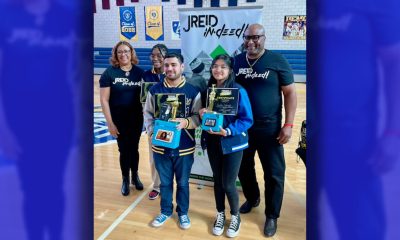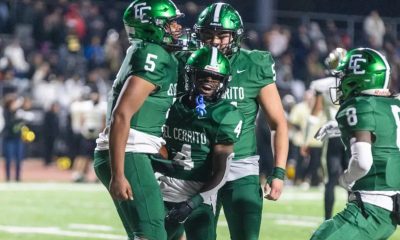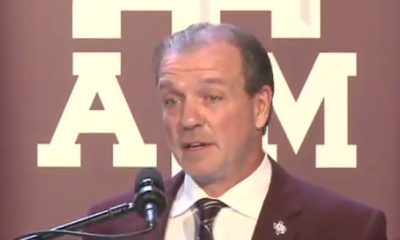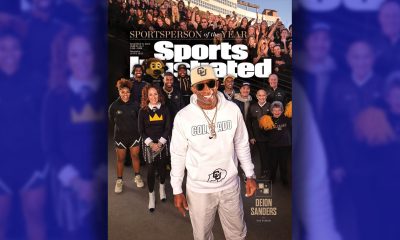Sports
Winston Brings Spotlight to Alabama Hometown for Draft

Jameis Winston reacts with his grandmother Myrtle Winston to learning he is the first pick in the NFL draft Thursday, April 30, 2015 in Bessemer, Ala. Winston was drafted by the Tampa Bay Buccaneers. (AP Photo/Hal Yeager)
JOHN ZENOR, AP Sports Writer
BESSEMER, Ala. (AP) — Jameis Winston celebrated the NFL draft his way, creating his own memorable moment with family and friends in his hometown. It was his mother who handed him his No. 3 Buccaneers jersey after he became the top pick, not the NFL commissioner.
For Winston, it was perfect.
“They actually felt the moment with me,” Winston told The Associated Press after the draft, clad in a dark suit with a gold tie and gold and black shoes. “I wasn’t just walking up by myself and getting taken away. They’re actually here with me right now, and it’s a blessing.”
The Heisman Trophy-winning Florida State quarterback was driven up to the spacious home of a family friend at 8:01 p.m. ET Thursday night, just a couple of minutes before the call came. A grinning Winston hung up the phone, turned to his family and announced he was heading to Tampa Bay.
“If you watched any Florida State games last year, we always cut it close,” Winston quipped about his arrival time. “But what happened? We always came through.”
He delivered again on Thursday — flashing smiles and poise in the face of the bright spotlight he’s already accustomed to. This time, he brought the national spotlight with him to Bessemer.
Earlier Thursday, camera crews filed in and out of Hueytown High School, where Winston’s No. 8 jersey is retired.
Everyone was in town on to see Winston, who skipped the televised festivities in Chicago to celebrate in his hometown, next door to Hueytown.
And he did it in grand style.
The home had a fountain in the front, a huge Winston banner on one side and tables in the back for guests, including Seminoles coach Jimbo Fisher. Traffic on the normally serene tree-lined road moved at a crawl beforehand. The scene had the feel of what was happening hundreds of miles away in Chi-Town.
This, however, was all just for Winston.
Commissioner Roger Goodell stepped to the podium in Chicago and ended the suspense, saying, “With the first pick in the 2015 NFL draft, the Tampa Buccaneers select Jameis Winston, quarterback, from Florida State.”
Fisher beamed like a proud father before the pick was announced.
“It’s just a great night,” Fisher said. “It’s a night to be joyful and happy for him.”
Plenty of people in these suburban Birmingham communities with a combined population of about 43,000 had planned to watch the draft and see if the Buccaneers would pick Winston.
“Just like we watched Bo Jackson,” said Bessemer’s Harry W. Carey.
Jackson is another Heisman-winning superstar who hails from Bessemer — and incidentally went No. 1 in the 1986 draft, to the Bucs.
Holly Adams, who taught Winston AP physics in 2011 at Hueytown High, said she hadn’t heard much buzz about the draft.
“Not really just because it’s become such a common thing in Hueytown to hear about Jameis,” Adams said. “But any time you get introduced to someone and they say, ‘Oh, this person teaches at Hueytown’ or ‘she’s from Hueytown,’ that’s the first thing they ask you. Do you know Jameis? Did you teach Jameis.”
Winston, though, remains a polarizing figure even in his hometown.
He was involved in several highly publicized off the field incidents while at Florida State, including the infamous crab legs caper. posted an Instagram photo of him celebrating on draft night with a tray of crab legs. Winston, showing he’s willing to make fun of himself, posted an Instagram photo of him celebrating with a tray of crab legs.
In a more serious allegation, a former FSU student has filed a lawsuit against Winston, accusing him of rape, assault, false imprisonment and emotional distress. Winston has said the sex was consensual and was never arrested or charged.
“We know more about him than we do any player in this draft,” Fisher said. “Every part of his life has been picked apart.
“People will be shocked with how he represents” the Bucs, the coach said.
Even those who expressed concern seem to be pulling for him.
Michael Raymond, a big Alabama fan from nearby Oak Grove, has mixed feelings about Winston, citing other incidents during the quarterback’s college career. He worries that “it’s almost a Johnny Manziel thing going on.”
He added, “being a quarterback, since they’re the key to everything, they’re willing to risk that kind of investment on somebody that could be a bust. I hope he’s not.”
Carey went to many of Winston’s games at neighboring Hueytown and his nephew was a childhood friend of the quarterback. He believes Winston deserves another chance at the “new life” Winston would later proclaim he’s embarking on.
“We’re all capable of making mistakes in life, but we should not hold that against him,” said Carey, while having lunch at a Hueytown barbecue restaurant. “We’re all human. We’re capable of doing things and learning from the mistakes we make in life.
“He’s going to make a difference in the game.”
___
AP NFL website: www.pro32.ap.org and www.twitter.com/AP_NFL
Copyright 2015 The Associated Press. All rights reserved. This material may not be published, broadcast, rewritten or redistributed.
Entertainment
O.J. Simpson, 76, Dies of Prostate Cancer
Orenthal James (O.J.) Simpson, who rose to fame as a college football player who went on to the NFL and parlayed his talents in acting and sportscasting, succumbed to prostate cancer on April 10, his family announced.
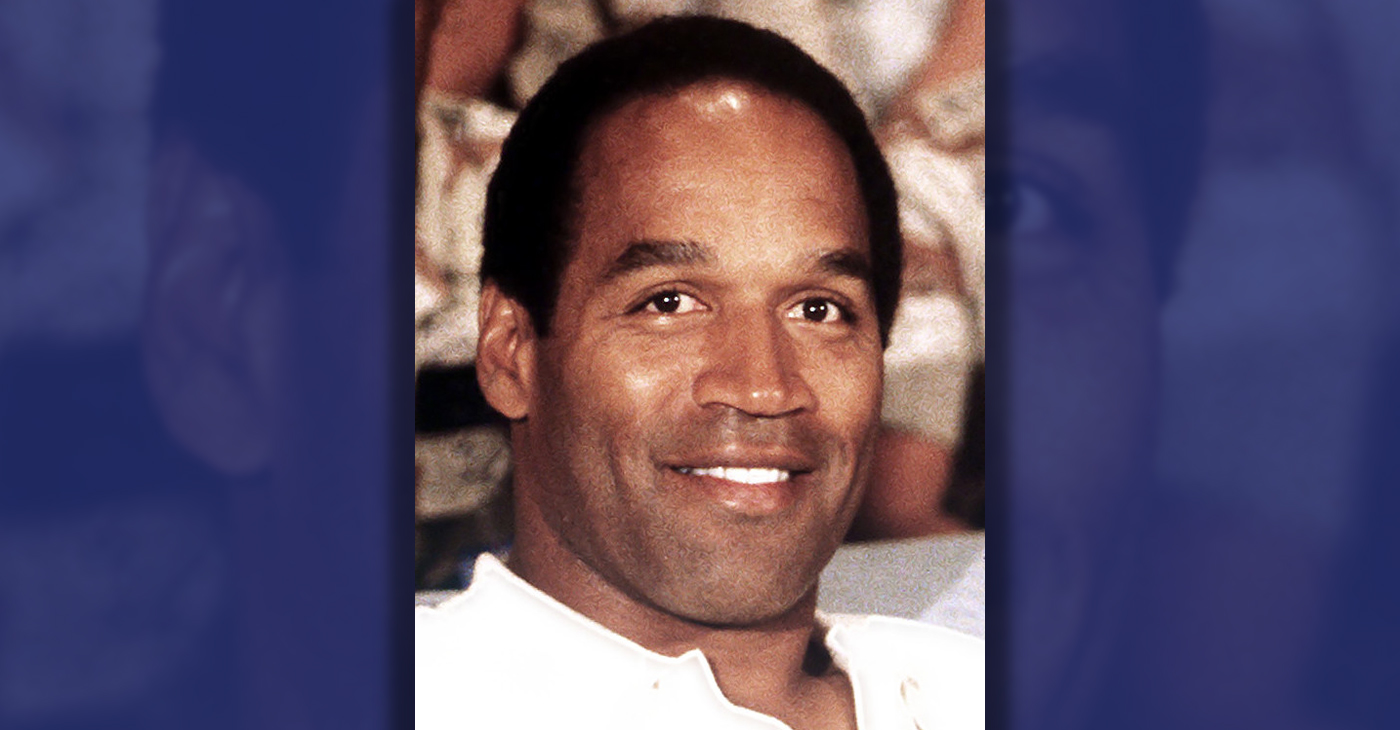
By Post Staff
Orenthal James (O.J.) Simpson, who rose to fame as a college football player who went on to the NFL and parlayed his talents in acting and sportscasting, succumbed to prostate cancer on April 10, his family announced.
Born and raised in San Francisco, the Galileo High School graduate was recruited by the University of Southern California after he was on a winning Junior College All-American team.
At USC, he gained wide acclaim as a running back leading to him becoming the No. 1 pick in the AFL-NFL draft in 1969 and joining the Buffalo Bills, where he had demanded – and received — the largest contract in professional sports history: $650,000 over five years. In 1978, the Bills traded Simpson to his hometown team, the San Francisco 49ers, retiring from the game in 1979.
Simpson’s acting career had begun before his pro football career with small parts in 1960s TV (“Dragnet”) before “Roots” and film (“The Klansman,” “The Towering Inferno,” Capricorn One”).
He was also a commentator for “Monday Night Football,” and “The NFL on NBC,” and in the mid-1970s Simpson’s good looks and amiability made him, according to People magazine, “the first b\Black athlete to become a bona fide lovable media superstar.”
The Hertz rent-a-car commercials raised his recognition factor while raising Hertz’s profit by than 50%, making him critical to the company’s bottom line.
It could be said that even more than his success as a football star, the commercials of his running through airports endeared him to the Black community at a time when it was still unusual for a Black person to represent a national, mainstream company.
He remained on Hertz team into the 1990s while also getting income endorsing Pioneer Chicken, Honey Baked Ham and Calistoga water company products and running O.J. Simpson Enterprises, which owned hotels and restaurants.
He married childhood sweetheart Marguerite Whitley when he was 19 and became the father of three children. Before he divorced in 1979, he met waitress and beauty queen Nicole Brown, who he would marry in 1985. A stormy relationship before, during and after their marriage ended, it would lead to a highway car chase as police sought to arrest Simpson for the murder by stabbing of Brown and her friend Ron Goldman in 1994.
The pursuit, arrest, and trial of Simpson were among the most widely publicized events in American history, Wikipedia reported.
Characterized as the “Trial of the Century,” he was acquitted by a jury in 1995 but found liable in the amount of $33 million in a civil action filed by the victims’ families three years later.
Simpson would be ensnared in the criminal justice system 12 years later when he was arrested after forcing his way into a Las Vegas hotel room to recover sports memorabilia he believed belonged to him.
In 2008, he received a sentence of 33 years and was paroled nine years later in 2017.
When his death was announced, Simpson’s accomplishments and downfalls were acknowledged.
Sports analyst Christine Brennan said: “… Even if you didn’t love football, you knew O.J. because of his ability to transcend sports and of course become the businessman and the pitchman that he was.
“And then the trial, and the civil trial, the civil case he lost, and the fall from grace that was extraordinary and well-deserved, absolutely self-induced, and a man that would never be seen the same again,” she added.
“OJ Simpson played an important role in exposing the racial divisions in America,” attorney Alan Dershowitz, an adviser on Simpson’s legal “dream team” told the Associated Press by telephone. “His trial also exposed police corruption among some officials in the Los Angeles Police Department. He will leave a mixed legacy. Great athlete. Many people think he was guilty. Some think he was innocent.”
“Cookie and I are praying for O.J. Simpson’s children … and his grandchildren following his passing. I know this is a difficult time,” Magic Johnson said on X.
“I feel that the system failed Nicole Brown Simpson and failed battered women everywhere,” attorney Gloria Allred, who once represented Nicole’s family, told ABC News. “I don’t mourn for O.J. Simpson. I do mourn for Nicole Brown Simpson and her family, and they should be remembered.”
Simpson was diagnosed with prostate cancer about a year ago and was undergoing chemotherapy treatment, according to Pro Football Hall of Fame President Jim Porter. He died in his Las Vegas, Nevada, home with his family at his side.
He is survived by four children: Arnelle and Jason from his first marriage and Sydney and Justin from his second marriage. He was predeceased son, Aaren, who drowned in a family swimming pool in 1979.
Sources for this report include Wikipedia, ABC News, Associated Press, and X.
Arts and Culture
Gov. Newsom and First Partner Jennifer Siebel Newsom Host 2024 Hall of Fame Ceremony
Former Assembly Speaker and San Francisco Mayor Willie Brown and three other African Americans were among 10 luminaries inducted into the 2024 Class of the California Hall of Fame on Feb. 8. The 17th Annual California Hall of Fame ceremony was held at the California Museum.
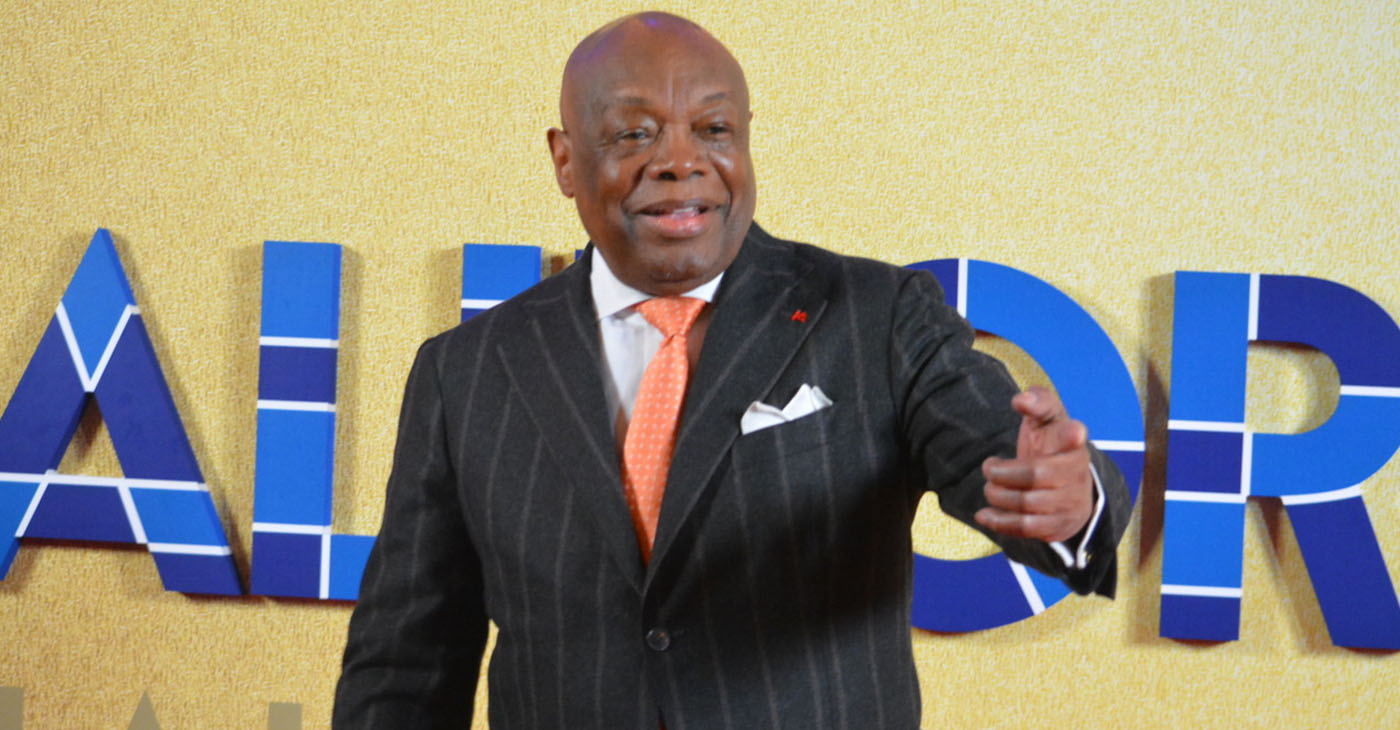
By California Black Media
Former Assembly Speaker and San Francisco Mayor Willie Brown and three other African Americans were among 10 luminaries inducted into the 2024 Class of the California Hall of Fame on Feb. 8.
The 17th Annual California Hall of Fame ceremony was held at the California Museum.
“The California Hall of Fame is one of our families’ favorite traditions as it is a time to come together to celebrate remarkable Californians as well as their loved ones because we know that it is about partnerships,” Siebel Newsom said. “The governor likes to say that California is a dream factory because it doesn’t matter what zip code or background you come from, the California dream is alive and well to everyone who calls this state home.”
The other Black honorees were filmmaker Ava DuVernay; Federal Judge and civil rights leader, the Hon. Thelton Henderson; and basketball Hall of Fame player and broadcaster Cheryl Miller.
“It’s what I’ve been waiting for and to be among a great group of individuals that also deserve the honor,” Brown told California Black Media on the event’s red carpet before the ceremony began. “No, I never thought someone from Texas would be recognized this way. But here I am, and it all happened in the great state of California. It’s a fantastic feeling.”
Other 2024 inductees are: master chef and “mother of fusion cuisine” Helene An; computer scientist and “father of the internet” Vincent A. Cerf; all-female pop punk band The Go-Gos; Chicano Rock band Los Lobos; former U.S. Secretary of Defense and Congressman Leon E. Panetta; and artistic director and choreographer Brenda Way.
This year’s honorees join a history-making club with over 150 inspirational Californians previously inducted for their groundbreaking achievements and personifying the state’s innovative spirit.
“It’s just a humbling experience. I want to thank the Governor and First Partner. Who would have thought 100 years ago (that I would be inducted?) It’s incredible,” Miller said after her induction. “I want to thank the governor and First Partner for an incredible event.”
During his acceptance speech, Henderson said he was deeply honored.
“You know, it really would have been a really big deal to be inducted into the Hall of Fame in the area where I grew up, for example, South Central Hall of Fame, or the Watts Hall of Fame, or the Straight Out of Compton Hall of Fame,” he said. “But being inducted into the California Hall of Fame, Hall of Fame of the greatest state in the country in this great nation is something else.”
Community
El Cerrito High Senior Jayvon Bolds Named to Blue-Grey All-American Bowl
El Cerrito High School senior Jayvon Bolds is set to play in the Blue-Grey All American Bowl game at Cowboy Stadium in Dallas on Jan. 8. Bolds, an 18-year-old scholar athlete whose favorite subject is history, was nominated for the honor by Rodney Alamo Brown, founder of Soulful Softball Sunday who also serves as an announcer for the Texas bowl game.
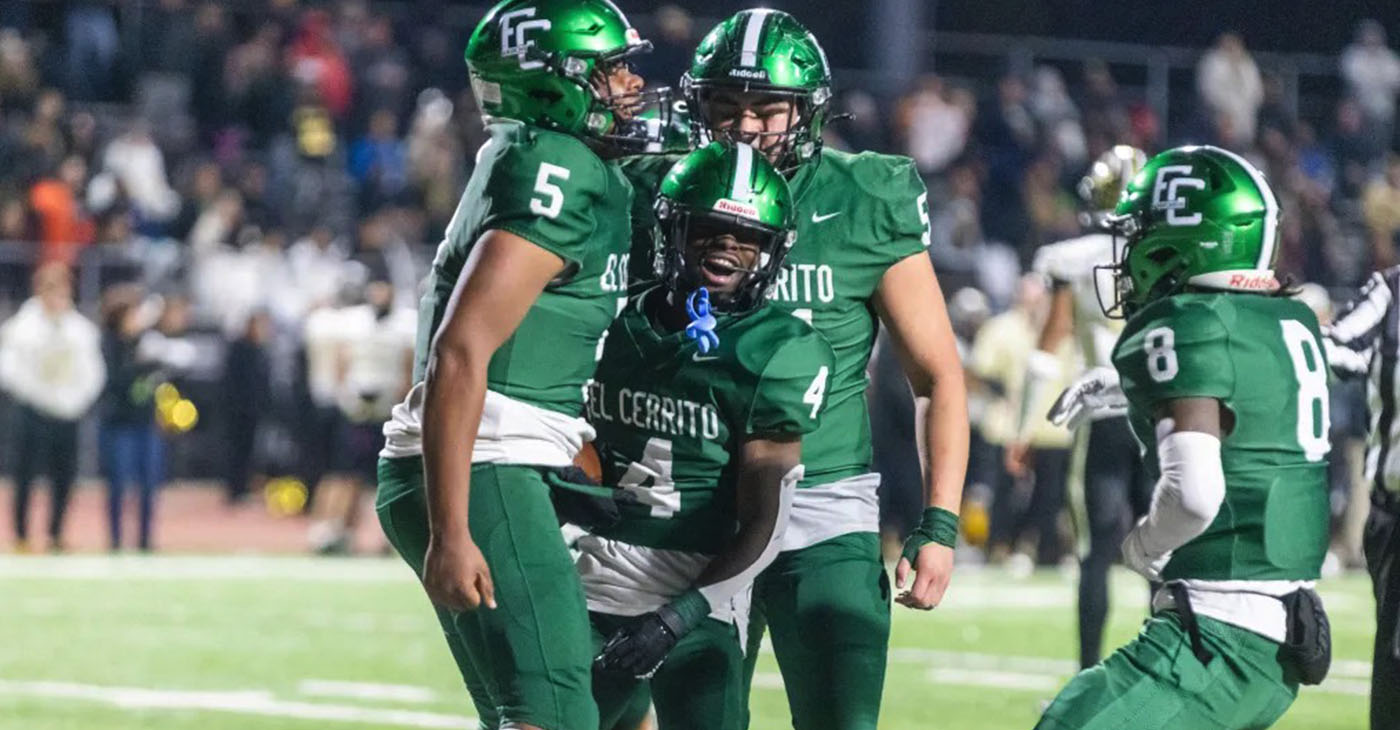
By the Richmond Standard
El Cerrito High School senior Jayvon Bolds is set to play in the Blue-Grey All American Bowl game at Cowboy Stadium in Dallas on Jan. 8.
Bolds, an 18-year-old scholar athlete whose favorite subject is history, was nominated for the honor by Rodney Alamo Brown, founder of Soulful Softball Sunday who also serves as an announcer for the Texas bowl game.
“It’s a real honor,” Alamo Brown stated about Brown’s selection for the bowl game. “This makes him an All-American.”
Bolds will play three positions for the Eastern team: kr, slot back and special teams—i.e., kickoff and punt return.
“The plan is to line up Bolds all over the field and let him do his thing. He’ll be a weapon for our staff,” said NFL veteran Tampa Bay Buccaneers standout and All-American Bowl Coach Dick Bell. “In a game like this, with the platform being an NFL facility with former professionals as assistants and mentors, he’ll have a chance to shine on one of the biggest stages around.”
Recently, Bolds received a scholarship offer to continue his higher education at Clarke University in Dubuque, Iowa.
Bolds maintains a 3.3 GPA and is heavily involved in leadership as he is the vice president of the Black Student Union.
Blue-Grey Football launched in 1989 by founders Gus and Erik Bell with the aim of helping prospects gain national exposure so that they can improve their chances to secure college scholarships.
Some of the nation’s most talented young football players compete in the annual game, with Fox Sports, CBS Sports and USA Today regularly providing coverage, as well as ESPN.com, Scout.com, Rivals.com and 247Sports.com.
Bolds’ family is planning on traveling to Dallas on Friday and is seeking donations from the community to offset the enormous cost. Those who are willing to donate may do so by sending their donations to this cash app, $Juanita Towns.
Rodney Alamo Brown contributed to this report.
-

 Activism4 weeks ago
Activism4 weeks agoOakland Post: Week of March 20 – 26, 2024
-

 #NNPA BlackPress3 weeks ago
#NNPA BlackPress3 weeks agoCOMMENTARY: D.C. Crime Bill Fails to Address Root Causes of Violence and Incarceration
-

 #NNPA BlackPress3 weeks ago
#NNPA BlackPress3 weeks agoMayor, City Council President React to May 31 Closing of Birmingham-Southern College
-

 #NNPA BlackPress3 weeks ago
#NNPA BlackPress3 weeks agoFrom Raids to Revelations: The Dark Turn in Sean ‘Diddy’ Combs’ Saga
-

 #NNPA BlackPress4 weeks ago
#NNPA BlackPress4 weeks agoCOMMENTARY: Lady Day and The Lights!
-

 Activism3 weeks ago
Activism3 weeks agoOakland Post: Week of March 27 – April 2, 2024
-

 #NNPA BlackPress4 weeks ago
#NNPA BlackPress4 weeks agoBaltimore Key Bridge Catastrophe: A City’s Heartbreak and a Nation’s Alarm
-

 #NNPA BlackPress4 weeks ago
#NNPA BlackPress4 weeks agoBaltimore’s Key Bridge Struck by Ship, Collapses into Water



